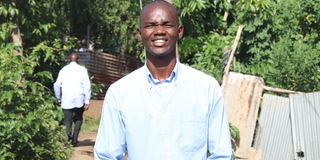The man helping girls in Homa Bay escape period poverty

What you need to know:
- Geoffrey, a law student at Kisii University, says he wants to provide alternative solutions to period poverty that affects girls in slums and rural areas.
- Before establishing YADE, he did his research on the accessibility of sanitary towels by adolescents in rural areas, and the results were shocking.
- He found out that some girls use pieces of cloth as sanitary towels.
BY GEORGE ODIWUOR
As a learner in primary school, Derrick Geoffrey Onyango recalls seeing some of his female classmates missing lessons because of menstrual hygiene.
In Class Seven, most girls in her class had started their menstrual cycle, but not many could afford sanitary towels, which made them develop low self-esteem.
Geoffrey says some were also caught by surprise and did not understand what was happening to them.
He recalls a day when a teacher asked a girl in their class to answer a question.
"The girl answered the question correctly. She however failed to stand up when answering, and the teacher ordered her to go out as a form of punishment.
“But the girl was still hesitant to leave her seat. It turned out that she was on her menses and had soiled her clothes that day because she didn’t have sanitary towels,” Geoffrey narrates.
The girl did not want anyone to know what was happening to her. Her skirt had blood stains which she was trying to cover.
“She finally stood up when the teacher, who did not know about her situation, insisted that she had to leave the classroom. Some of her classmates knew what was happening and came to her aid. They covered her with a sweater and escorted her out.”
Geoffrey says as the girl walked out, some of her peers, especially boys, laughed at her, oblivious to the challenge she was going through.
"I came to learn that the majority of girls who missed school on certain days did so because they could not afford to purchase sanitary towels. They chose to stay home to avoid embarrassment," he says.
After the experience, Geoffrey developed a passion for helping teenagers and young girls get sanitary towels.
Together with a group of like minded young people, he started an organisation called YADE sanitary pads which offers cheaper sanitary towels to girls from vulnerable communities.
YADE trains adolescent girls on how to make reusable pads with the goal of ending period poverty, stigma and other taboos around menstrual hygiene.
Geoffrey, a law student at Kisii University, says he wants to provide alternative solutions to period poverty that affects girls in slums and rural areas.
Before establishing YADE, he did his research on the accessibility of sanitary towels by adolescents in rural areas, and the results were shocking.
He found out that some girls use pieces of cloth as sanitary towels.
"Others use mattresses. Some do not use anything," he says.
His study was backed by other findings from the Department of Health in Homa Bay county.
Because of this challenge, cases of truancy, absenteeism and dropping out among girls in Homa Bay have increased significantly.
Homa Bay is among the leading counties in teenage pregnancies, and most of the girls who fall victim come from poor families.
“Mostly, the teenage girls end up being lured by men who can buy them things like sanitary towels. These men often ask for sexual favours, and when the girl conceives, they disappear into thin air," he says.
Geoffrey is Yade’s programme coordinator, and he is assisted by the group's medical officer Kefa Aywa who is a nurse at St Paul's Mission Hospital, and Fauzia Mustafa who is a medical student. The group also works with volunteers who include teachers from schools whose students have benefited from the programme.
On May 17, the team went to Nyakango Mixed secondary school where more than 150 students, including boys, were taught how to make reusable sanitary towels.
At the school, 63 students have become pregnant between 2021 and now. 55 others contracted urinary tract infections between 2022 and this year, with some cases being caused by poor menstrual hygiene.
"*We have been using our money all along. We spend up to Sh 30,000 in one lesson," he says. The money is used to purchase the different materials used in making the towels.
The materials used include nylon, cotton and polyester. Other tools used in making the reusable sanitary towels include scissors, thread and sewing needle.
“During our lessons, learners start by drawing a sketch that resembles a cross on a piece of paper. Using the sketch, they cut out the materials and get the correct measurements. The pieces of waterproof material are joined using sewing thread, and two pieces of cotton are then put in between the layers.
“Once the materials are put together, an outer layer is added at the bottom, which has buttons or stickers that hold onto innerwear. We advise girls to have at least three pads which they can wash and use for several months,” Mustafa says.
By March this year, the team had reached more than 1,000 students in 10 different schools in Homa Bay.
Aywa says use of materials such as mattresses and cloths during menses can lead to urinary tract infections because such materials are not sterile.
“Bacterial buildup may extend to the uterus and cause diseases such as pelvic inflammatory illnesses, and could also cause infertility,” Aywa says.
[email protected]





